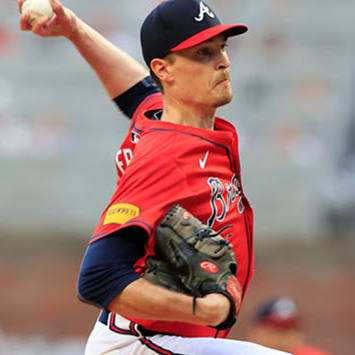This article is part of our Closer Encounters series.
Are you worried about Liam Hendriks?
The two-time AL Reliever of the Year has four saves (T-3rd in the league) in five chances, but has struggled through four of those appearances. Below are his game logs through April 19:

Last year, the Australian native allowed just seven hits in April (four of which were home runs), but he's already permitted a whopping 11 hits in five appearances with roughly 10 days remaining this month. His .625 BABIP is due for extreme positive regression, but he's still allowing a 41.2 hard-hit percentage and has allowed three barrels in 17 batted-ball events after allowing just two barrels during the entire COVID-19 shortened 2020 campaign.
Hendriks is throwing more pitches than usual, laboring through several of his outings:
| Date | Pitches | Balls | Strikes |
|---|---|---|---|
| Apr 16 | 29 | 13 | 16 |
| Apr 15 | 14 | 4 | 10 |
| Apr 13 | 19 | 5 | 14 |
| Apr 12 | 25 | 9 | 16 |
| Apr 8 | 33 | 13 | 20 |
| AVG | 24 | 8.8 | 15.2 |
In his small 2022 sample, Hendriks is averaging 24 pitches (8.8 balls, 15.2 strikes) per game after averaging 16 pitches (5.3 balls, 11 strikes) per game through his 69 appearances in 2021.
So what can be attributed to Hendriks' rough start?
I previously touched on Hendriks' reduced velocity during spring training and thought that might be of concern, but his regular-season fastball, slider and curveball velocity appear to be in line with last season, per FanGraphs:

In particular, he's averaging 97.3 miles per hour on his fastball, of which he
Are you worried about Liam Hendriks?
The two-time AL Reliever of the Year has four saves (T-3rd in the league) in five chances, but has struggled through four of those appearances. Below are his game logs through April 19:

Last year, the Australian native allowed just seven hits in April (four of which were home runs), but he's already permitted a whopping 11 hits in five appearances with roughly 10 days remaining this month. His .625 BABIP is due for extreme positive regression, but he's still allowing a 41.2 hard-hit percentage and has allowed three barrels in 17 batted-ball events after allowing just two barrels during the entire COVID-19 shortened 2020 campaign.
Hendriks is throwing more pitches than usual, laboring through several of his outings:
| Date | Pitches | Balls | Strikes |
|---|---|---|---|
| Apr 16 | 29 | 13 | 16 |
| Apr 15 | 14 | 4 | 10 |
| Apr 13 | 19 | 5 | 14 |
| Apr 12 | 25 | 9 | 16 |
| Apr 8 | 33 | 13 | 20 |
| AVG | 24 | 8.8 | 15.2 |
In his small 2022 sample, Hendriks is averaging 24 pitches (8.8 balls, 15.2 strikes) per game after averaging 16 pitches (5.3 balls, 11 strikes) per game through his 69 appearances in 2021.
So what can be attributed to Hendriks' rough start?
I previously touched on Hendriks' reduced velocity during spring training and thought that might be of concern, but his regular-season fastball, slider and curveball velocity appear to be in line with last season, per FanGraphs:

In particular, he's averaging 97.3 miles per hour on his fastball, of which he throws 64 percent of the time, after averaging 97.7 mph on the pitch last season.
After digging a bit deeper, Daryl Van Schouwen of the Chicago Sun Times reported Hendriks recently met with White Sox pitching coach Ethan Katz and assistant pitching coach Curt Hasler to review his delivery. A Codify client since 2019, Hendriks essentially ran the meeting and the following were discussed as potential things to address:
- height of release point
- release angle slightly off
- fastball location is off
- overthrowing his slider
Below are a few excerpts from Van Schouwen's article that I found particularly interesting:
Because of the abbreviated spring training caused by the lockout, right now is when pitchers ordinarily would be putting the finishing touches on their preparations. Hendriks has been far from precise in terms of locating his four-seam fastball to go with a biting slider and occasional curve.
"I'm just not getting the fastball after [a good slider] into the right location," Hendriks said Saturday. "That seems to be the issue I'm going through right now."
On a positive note, Hasler didn't seem too concerned after Hendriks' deep dive and went on to say "he's on the right track:"
"The metrics are fine," Hasler said. "A lot of things point to him being OK. The ball has not been hit as hard as what we maybe think. He's getting strikeouts. Got some bad counts, pulling the ball he's not trying to pull. He's trying to stay behind the ball."
The discussion was about the height of Hendriks' release point, his release angle being a shade off from center and other fine points of his delivery.
"He is right on track; he's right where he needs to be," Hasler said. "He has a real good grasp of things."
In an unrelated post, Jay Cuda suggested on Twitter that Hendriks could be tipping his pitches. The eagle-eyed Cuda includes visual examples supporting his theory:
liam hendriks is "tipping" his pitches this season. same as last yr before he fixed it.
-on breaking balls the batter doesn't see ball during his delivery
-on fastballs liam shows the hitter the ball firstmade pic below (all clips from this yr) to show what i'm talking about pic.twitter.com/BGjJ5vYVdB
— Jay Cuda (@JayCuda) April 19, 2022
Do you think the White Sox closer is on the cusp of a rebound in the near future?
Cardinal Truth
Katie Woo recently wrote a fantastic piece for The Athletic after the Cardinals split their four-game set against their NL Central division rival Brewers over the weekend. She revealed an example of new manager Oli Marmol's analytical approach to decision making in the late-innings:
From a pitching aspect, Marmol was able to showcase how he would ideally operate the bullpen in the Cardinals' 2-1 victory over Milwaukee on Saturday. After Steven Matz was lifted after 5 2/3 scoreless innings, Marmol elected for Ryan Helsley to face Hunter Renfroe. The Cardinals were up 1-0, but the Brewers had runners on first and second with two outs. Helsley fell behind to a 3-1 count, but maneuvered a slider past Renfroe before firing a 101.2 mph four-seamer for the strikeout.
From there, Marmol relied on two innings from Génesis Cabrera and a four-out save from Giovanny Gallegos. At first glance, it was surprising to see Cabrera, a lefty reliever, come in to a clean inning to face three right-handed hitters in Keston Hiura, Tyrone Taylor and Lorenzo Cain. But he retired the side in order before drawing the left-handed Kolten Wong, right-handed Mike Brosseau and the switch-hitting Victor Caratini. Caratini ultimately bested Cabrera with a solo shot to put the Brewers within a run, but Marmol swapped in a well-rested Gallegos for the four-out save opportunity.
Giovanny Gallegos earned the save and is the team leader with two, but what I found fascinating were Marmol's comments on why he used the left-handed Genesis Cabrera against three right-handed hitters to kick off the seventh inning:
When asked why he opted for Cabrera for two innings against a slew of right-handers, Marmol elaborated.
"It actually had more to do with when you look at their bench," Marmol explained. "Their best shot there is to unload their bench, they're itching to do it. Our job going into tonight's game was to keep those four guys (Tellez, Yelich, Narváez, Peterson) on the bench. You could've gone (Jordan) Hicks, and they would've flipped the lineup down there. But we thought it'd be a better place for (Cabrera) and keep the lefties on the bench and then hand it over to (Gallegos) for their top three guys, because they aren't going to pinch-hit for them.
"(Cabrera's) done a nice job and he's shown the ability to get righties out. So at that point, you're thinking through, do I like keeping their righties in the lineup with a guy that gets righties out in Cabrera, or do you flip that and let them unload their bench?"
This deep, next-level bullpen analysis is what I aim to seek out and share with you throughout the season.
Royal Blues?
 Royals - Fantasy managers who drafted Scott Barlow expecting saves are likely a bit frustrated that Kansas City's first two saves of 2022 went to Josh Staumont in the team's eighth and ninth games of the season. However, there's still reason to be optimistic that Barlow will eventually see save opportunities. Look at his 2022 appearances below, of which I note the context upon which Barlow entered each game:
Royals - Fantasy managers who drafted Scott Barlow expecting saves are likely a bit frustrated that Kansas City's first two saves of 2022 went to Josh Staumont in the team's eighth and ninth games of the season. However, there's still reason to be optimistic that Barlow will eventually see save opportunities. Look at his 2022 appearances below, of which I note the context upon which Barlow entered each game:
| Pitcher | 1st App | 2nd App | 3rd App | 4th App |
|---|---|---|---|---|
| Scott Barlow | T8th (Tied 1-1, 0 out) facing CLE 3-4-5 2 IP, 0 ER, 3:0 K:BB, W | T8th (KC Losing 5-6, 2 on, 1 out) facing CLE 9-1-2 0.1 IP, 1ER, 0:1 K:BB | T9th (KC Losing 1-2, 0 out) facing DET 3-4-5 1 IP, 0 ER, 1:0 K:BB | T8th (KC Ahead 3-1, 0 out) facing DET 3-4-5 1.1 IP, 0 ER, 2:0 K:BB, HLD |
His fifth appearance of the season came Tuesday night against Minnesota in the the top of the eighth inning, with Kansas City leading 4-3. It was against the Twins' 6-7-8 hitters. Based on his use in 2022, Barlow is still clearly one of Kansas City's highest leverage relievers, having worked close games in each of his appearances, with the majority against the heart or top of the lineup. This type of use will lead to save chances as the season progresses.
While Barlow has a win, two holds and excellent ratios (1.59 ERA, 0.88 WHIP) in 5.2 innings, I'm still cautious, as I have done since my initial closer rankings were released in February.
For starters, Barlow's velocity is down across all three of his pitches. I touched on this briefly during my last article, but Statcast data from Barlow's April 16 appearance shows his velocity is still trending downward:

Of his 13 pitches Tuesday night, Barlow only threw one fastball at 90.3 miles per hour, a 5 mph difference than his average:

It's still early in the season and all pitchers across the league are coming off a much shorter window for spring training. It's possible Barlow is still ramping up for the long haul of the season. However, what Barlow is lacking in velocity is a strength of the aforementioned Staumont and emerging rookie Dylan Coleman. Both relievers throw or nearly hit 100 miles per hour on their respective fastballs and could be called on for saves against teams whose hitters struggle against the heater, whereas Barlow's fastball is his weakest offering after allowing a .275 average and .396 slugging on the pitch last year. This is why Barlow throws his 85-mph slider as his primary pitch 46 percent of the time.
Also worth monitoring is Royals rookie Collin Snider. The 26-year-old right-hander out of Vanderbilt pitches in middle relief, but has yet to be scored upon and already has two wins through his first five appearances. It's obviously still early in the season and a small sample size, but Snider's Statcast profile looks promising:

Other Closer Notes Around the League
 Athletics - A's closer Lou Trivino, along with relievers A.J. Puk and Kirby Snead, were placed on the COVID-19 injured list on Monday. This left Oakland's relief corps a bit short-handed for their series opener Monday against Baltimore. However, three relievers stepped up in Trivino's absence to preserve starter Frankie Montas's six-inning gem. Domingo Acevedo, Justin Grimm and Dany Jimenez pitched a scoreless seventh, eighth and ninth inning, respectively, to preserve the 5-1 victory. Jimenez, who has Oakland's only other save this season aside from the two that Trivino tallied, appears to be the next in line for saves whenever Trivino is unavailable.
Athletics - A's closer Lou Trivino, along with relievers A.J. Puk and Kirby Snead, were placed on the COVID-19 injured list on Monday. This left Oakland's relief corps a bit short-handed for their series opener Monday against Baltimore. However, three relievers stepped up in Trivino's absence to preserve starter Frankie Montas's six-inning gem. Domingo Acevedo, Justin Grimm and Dany Jimenez pitched a scoreless seventh, eighth and ninth inning, respectively, to preserve the 5-1 victory. Jimenez, who has Oakland's only other save this season aside from the two that Trivino tallied, appears to be the next in line for saves whenever Trivino is unavailable.
 Rockies - You might be surprised to discover that, through April 19, the Colorado bullpen ranks fifth in the league with a 2.30 ERA. It also leads the league with eight saves, with Daniel Bard leading the team with five saves in six chances. Remember, manager Bud Black doesn't do committees and Bard got a fairly long leash in the closer role last season despite struggling much the year. I have recently adjusted Bard's security in the closer role accordingly, up from Low to Medium.
Rockies - You might be surprised to discover that, through April 19, the Colorado bullpen ranks fifth in the league with a 2.30 ERA. It also leads the league with eight saves, with Daniel Bard leading the team with five saves in six chances. Remember, manager Bud Black doesn't do committees and Bard got a fairly long leash in the closer role last season despite struggling much the year. I have recently adjusted Bard's security in the closer role accordingly, up from Low to Medium.
 Orioles - Yet another surprising revelation through mid-April is Baltimore's bullpen ranks seventh in the league with a 2.66 ERA. This comes after the team traded closer candidates Cole Sulser and Tanner Scott to Miami before the season. Veteran Jorge Lopez gets the attention since he's recorded the team's only save, but keep an eye on 25-year-old Cionel Perez. The southpaw averages 96 mph on his fastball and hasn't been scored upon since last season. Perez logged six scoreless Grapefruit League innings during spring training and has four scoreless innings through five regular season appearances. He's had an issue with walks, with a 5.9 BB/9 in 53.2 career innings, but has yet to walk a batter in 2022.
Orioles - Yet another surprising revelation through mid-April is Baltimore's bullpen ranks seventh in the league with a 2.66 ERA. This comes after the team traded closer candidates Cole Sulser and Tanner Scott to Miami before the season. Veteran Jorge Lopez gets the attention since he's recorded the team's only save, but keep an eye on 25-year-old Cionel Perez. The southpaw averages 96 mph on his fastball and hasn't been scored upon since last season. Perez logged six scoreless Grapefruit League innings during spring training and has four scoreless innings through five regular season appearances. He's had an issue with walks, with a 5.9 BB/9 in 53.2 career innings, but has yet to walk a batter in 2022.
 Padres - Taylor Rogers is tied for the National League lead with five saves (one behind league leader Jordan Romano, who has six). Padres setup man Pierce Johnson is tied for second in the league with four holds. Either Johnson or Robert Suarez, who saved 42 games in Japan last year, figure to mix in for ninth-inning duties when Rogers is unavailable.
Padres - Taylor Rogers is tied for the National League lead with five saves (one behind league leader Jordan Romano, who has six). Padres setup man Pierce Johnson is tied for second in the league with four holds. Either Johnson or Robert Suarez, who saved 42 games in Japan last year, figure to mix in for ninth-inning duties when Rogers is unavailable.
 Guardians - Emmanuel Clase, who recently inked a five-year contract extension with the Guardians earlier this month, has yet to be afforded a save opportunity through Cleveland's first nine games. The hard-throwing right-hander is 0-1 with a 9.00 ERA and 2.50 WHIP through his first three games. It's a small sample, but Clase is throwing his slider more often this season (38.6 percent of the time compared to 29.8 percent last year). This is a good sign since he stifled batters with the pitch last season, holding them to a .110 batting average and .134 slugging percentage.
Guardians - Emmanuel Clase, who recently inked a five-year contract extension with the Guardians earlier this month, has yet to be afforded a save opportunity through Cleveland's first nine games. The hard-throwing right-hander is 0-1 with a 9.00 ERA and 2.50 WHIP through his first three games. It's a small sample, but Clase is throwing his slider more often this season (38.6 percent of the time compared to 29.8 percent last year). This is a good sign since he stifled batters with the pitch last season, holding them to a .110 batting average and .134 slugging percentage.









